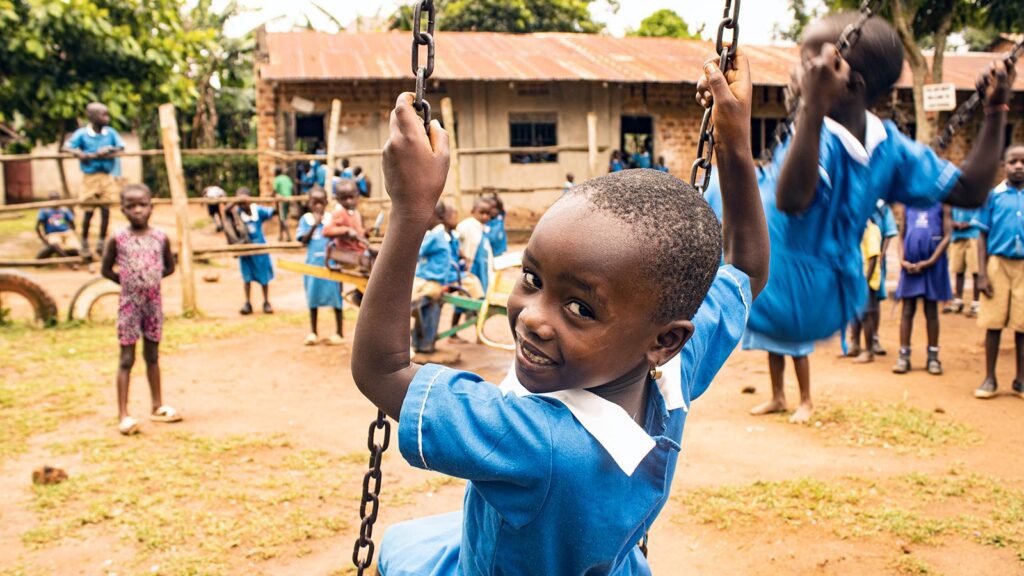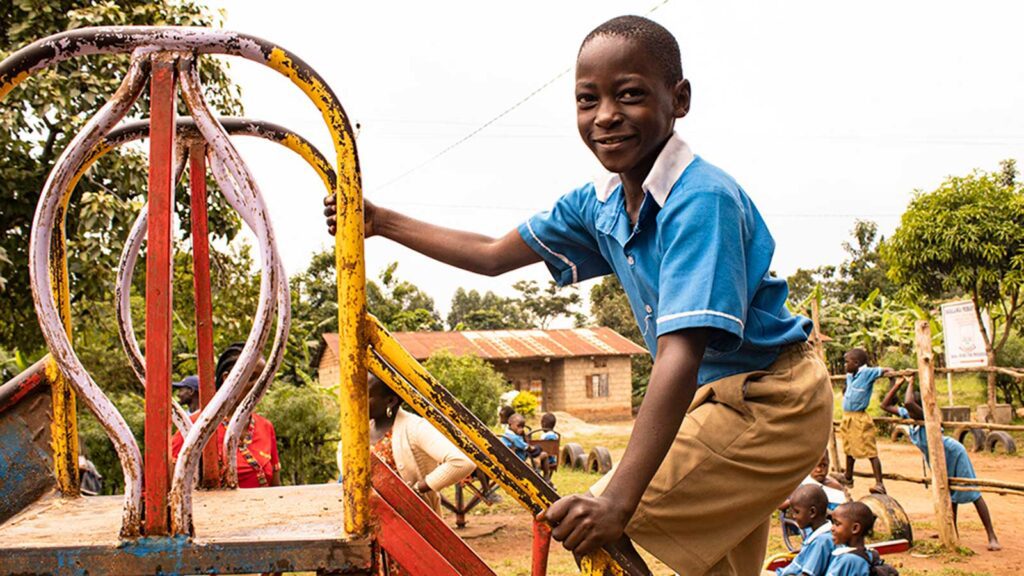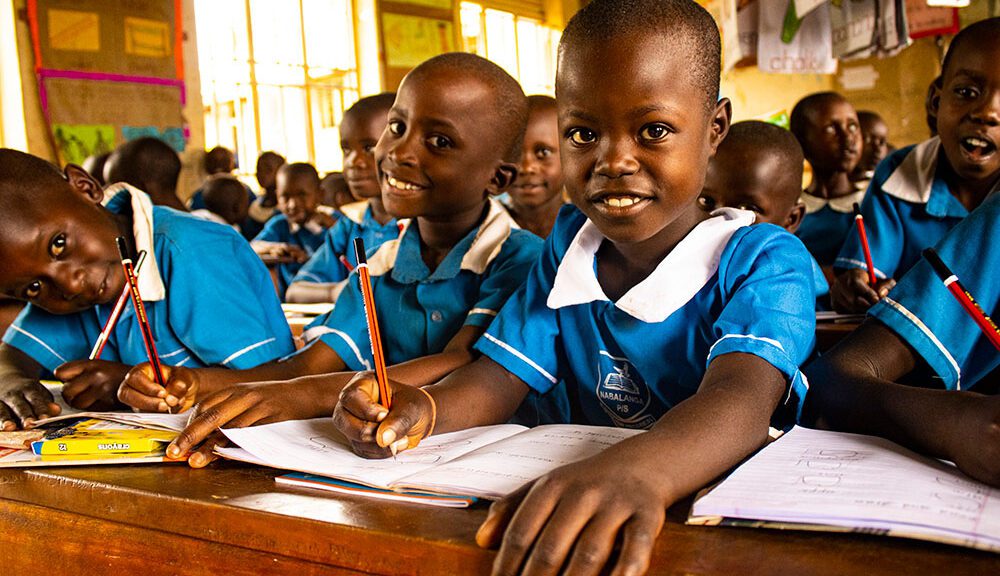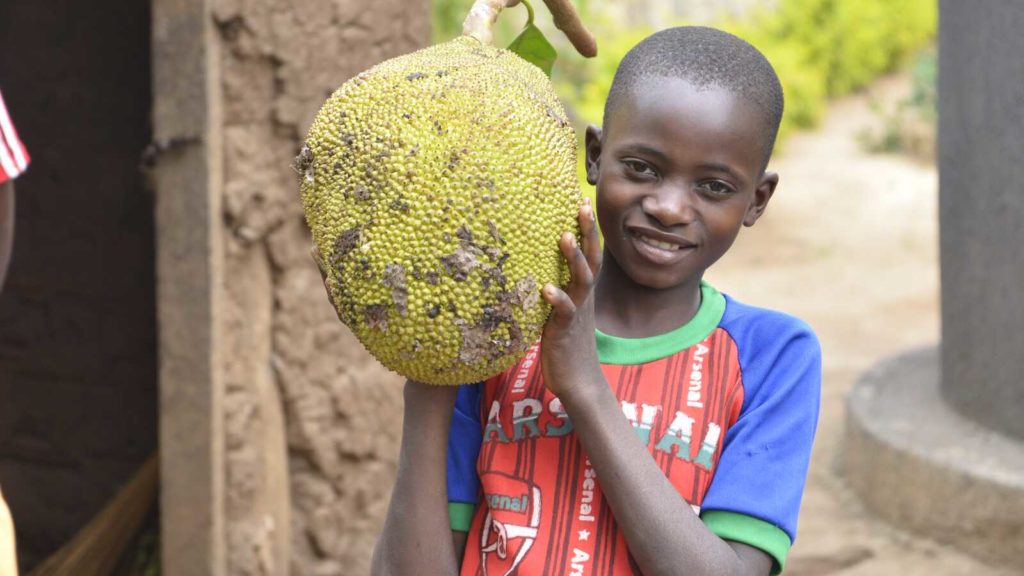Early childhood care and education can help lift children and their families out of poverty. With the support of Holt sponsors, hundreds of children in Uganda are now learning — and thriving. Patience is a 6-year-old girl who...
Early childhood care and education can help lift children and their families out of poverty. With the support of Holt sponsors, hundreds of children in Uganda are now learning — and thriving.
Patience is a 6-year-old girl who lives with her grandmother in an impoverished rural village in central Uganda. Each school day, Patience attends a nearby early childhood care and development (ECCD) center, a safe and cheerful place supported by Holt Uganda. There, she has the opportunity to read and write, play and develop social skills, eat nutritious meals and learn the importance of an education at an early age. What’s more, Patience is able to attend the ECCD center thanks to the generosity of Holt sponsors, who help pay for her school fees, supplies, uniform and more. Her grandmother, a fruit and vegetable farmer, could not be happier or more grateful. She believes the foundation Patience is receiving now will set the stage for her success in primary school and later in life.
 Patience spends her days at a Holt-supported early childhood care and development center learning and playing with other children.
Patience spends her days at a Holt-supported early childhood care and development center learning and playing with other children.
Breaking the Cycle of Poverty
In Uganda today, nearly 20% of the population lives in chronic poverty. Poverty is most prevalent in rural areas of the nation, where roughly 75% of the population live. Uganda is also a country where armed fighting among ethnic groups, a high infant mortality rate, poor access to medical care and pervasive HIV/AIDS have all placed additional stress on families. Many children in Uganda have lost one or both of their parents to conflict or HIV, leaving grandparents, extended family or an older sibling to care for them.
Since 2001, Holt has been working in Uganda to help vulnerable families and children, particularly those affected by HIV/AIDS. In 2009, Holt initiated a child sponsorship program — matching children living in poverty with sponsors in the U.S. who help provide essential funding for basic nutrition, medical care, shelter and education.
While sponsors help meet the immediate survival needs of children, education is also key to the sponsorship program as it is one of the most powerful tools children can use to break the cycle of poverty. This is particularly true in Uganda, which has one of the youngest populations in the world, with a median age of 16.7 years. Education not only prepares a child for their future, but it also helps to combat early marriage, child labor and trafficking, family migration and gender inequality.
Today, Holt sponsors help support eight ECCD centers, with 24 teachers and more than 900 children, as well as their corresponding primary schools. “This allows us to support these children from preschool through primary school,” says Malia Robello, MSW, Holt program manager for Haiti, Colombia, Ethiopia and Uganda. In fact, Malia says, “more than 95 percent of children in our ECCD programs go on to primary school.”
As everywhere Holt works, our team in Uganda takes a special focus on empowering girls and women — and sponsors support this effort by helping girls receive an early education and go on to primary and secondary school. In Uganda, families often prioritize educating their sons, and will choose to send their son to school and keep their daughter home if they can only afford school fees for one child.
But both boys and girls face obstacles to completing their education in Uganda.
Robert is a 9-year-old boy who lives with his grandmother in a remote Ugandan village. Though his grandmother had always hoped that Robert could attend school, she was unable to pay his fees. But now, with the support of Holt sponsors, Robert happily attends the local primary school, where he recently was named top student. He aspires to be the best player on his school’s soccer team and to one day play for the Cranes, Uganda’s national soccer team. Because of his nurturing school environment, Robert’s future is filled with hopes and dreams!
 Robert was recently named top student at his primary school and hopes to one day play for Uganda’s national soccer team.
Robert was recently named top student at his primary school and hopes to one day play for Uganda’s national soccer team.
Help from Holt Sponsors
Patience and Robert are both able to receive an education thanks to the generous support of Holt sponsors. But not every child in Uganda has this opportunity. In the late 1990s, the Ugandan government implemented a Universal Primary Education policy that increased access to education for millions of children nationwide. However, in the rural villages where Holt sponsors and donors support children, more than 30% of 6- to 9-year-olds have never attended or are not able to attend primary school. There are several reasons why. For one thing, education in Uganda is very expensive. The cost of school fees, books, supplies and uniforms is prohibitive for families living in poverty. In rural areas, children may be unable to walk to school if the school is located too far away. As a result, many children drop out or never go to school in the first place.
The same holds true for younger children, which is why early childhood care and development is an important pillar of Holt’s work in Uganda. In many parts of the nation, children under age 8 are still considered too young to attend school and go without any formal preparation for primary education. If a family cannot afford to send their child to preschool, or if the school is too far away for them to walk to, young children often go to work with their parents or stay at home without proper supervision. They also miss out on a critical early education.
In 2017, Holt began its ECCD programs in remote, rural communities in central Uganda. Today, Holt sponsors help support eight ECCD centers, with 24 teachers and more than 900 children, as well as their corresponding primary schools. “This allows us to support these children from preschool through primary school,” says Malia Robello, MSW, Holt program manager for Haiti, Colombia, Ethiopia and Uganda. In fact, Malia says, “more than 95 percent of children in our ECCD programs go on to primary school.”
Children at all Holt-supported preschools receive a nutritious mid-morning meal to ensure they are ready to learn each day.
Overall, the ECCD programs provide a holistic introduction to education for children ages 3 and up, focusing on their intellectual, physical and social development. At school, children learn basic language, problem-solving and number skills, have the chance to play on child-friendly indoor and outdoor equipment, and socialize with their peers. Children at all Holt-supported ECCD centers also receive a mid-morning meal consisting of a nutritious bowl of grain porridge with juice and fruit or eggs for extra protein. These meals ensure that children are well fed and ready to learn each day!
Parents and other family caregivers of children in ECCD programs reap their own benefits as well. “Because children are in these safe spaces [throughout the day], caregivers have an opportunity to work in their gardens and attend to their income-generating activities without worrying about the safety of their young children,” says Lydia Nyesigomwe, Holt Uganda country director.
Family caregivers also receive training in health, nutrition, sanitation and hygiene so that they can help their children thrive, at home and in their communities. They are also encouraged to become involved in their children’s education and to participate in parent-teacher associations. This is particularly important for the parents or caregivers of girls. “Access to education, especially at a young age, creates inspiration, helps develop confidence and normalizes academic achievement for girls,” says Malia. “Through Holt’s advocacy and promotion of inclusive education, parents learn about the benefits of educating their daughters — as well as their sons.”
 Runako was previously a shy child with low self-esteem. But now she loves to go to school and sing in the school choir.
Runako was previously a shy child with low self-esteem. But now she loves to go to school and sing in the school choir.
Each year, Holt sponsors and donors make it possible for more than 1,200 children living in rural villages in Uganda to attend preschool and primary school. Through their generosity, the ECCD centers are provided with teacher training programs, enriching school materials, child-size chairs and desks, play equipment, nutritious meals and other necessities. Young children who might not otherwise attend school are assisted with school fees, books and supplies, as well as the cost of school uniforms. “Uniforms are a huge motivator, especially for children in ECCD programs,” says Malia. “They feel proud wearing their uniforms and representing their school, and they love looking sharp with their classmates.”
Most of all, attendance at an ECCD center nurtures a child’s physical and mental development and prepares them for primary school with important skills and ambitions. For one little girl named Runako, an early childhood education made all the difference. Runako is one of five children, the daughter of a single mother. Thanks to her Holt sponsor, Runako has been enrolled in her local ECCD center since March 2021. Since then, she has gone from being a shy child with low self-esteem to one who loves going to school, singing in the school choir and leading her peers during activities. At 8 years of age, Runako is thriving both at home and at school — and looks forward to attending primary school before long!

Learn more about Holt’s work in Uganda!
See how sponsors and donors create a brighter, more hopeful future for children and families in Uganda!
The post How Early Childhood Education Benefits Children in Uganda appeared first on Holt International.


